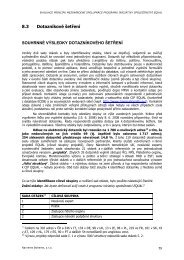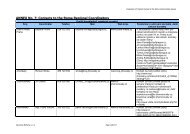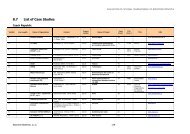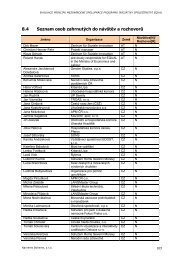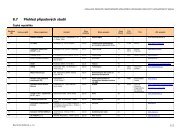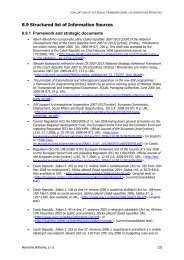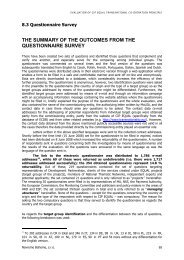EQUAL - Final report - eng - navreme
EQUAL - Final report - eng - navreme
EQUAL - Final report - eng - navreme
You also want an ePaper? Increase the reach of your titles
YUMPU automatically turns print PDFs into web optimized ePapers that Google loves.
EVALUATION OF CIP <strong>EQUAL</strong> TRANSNATIONAL CO-OPERATION PRINCIPLE<br />
from the European Commission that sets up the conditions, under which an organisation may be<br />
excluded from the possibility to obtain public funds redistributed by the Commission, namely<br />
either for ever (in case of very serious wrongful acts) or for the period of five years (in case of<br />
minor wrongful acts).<br />
• We propose to clarify contingent role the managing authority may play in mainstreaming already<br />
in the stage of preparation and implementation of the projects and to solve all the elements of<br />
dissemination and mainstreaming in time within the framework of the projects.<br />
• One of the aspects of sustainability is also the issue of maintaining and development of the knowhow<br />
developed by the organisations, the bearers of which are concrete employees. If the project<br />
termination means loss of these people, it is partially also the loss of the created know-how. The<br />
activities aiming at further development of the created know-how should thus take account also of<br />
the concrete people, who are its bearers: the managing authority should be able to include them<br />
in consequential programmes (lobbying at national and European level, seminars and the like).<br />
7.2.6 Monitoring and evaluation<br />
• It is necessary to help the projects to be able to use the monitoring and evaluation tools for<br />
their own quality management and the project cycle management.<br />
• It is necessary to modify the methodological aids, to focus the educational and training<br />
activities of MA on this area for purpose of elucidation of the actual significance of monitoring<br />
and evaluation, how to order and implement them (including allocation of appropriate<br />
capacities already when drawing up the project’s plan and budget), how to assess their<br />
quality (especially in case of ordering external evaluations and management of internal<br />
evaluations) and how to use them well for the management itself.<br />
• Monitoring should serve also for comparisons, aggregation for certain areas (the thematic or<br />
regional viewpoint suggests itself), programme management (setting priorities), as the case<br />
may be as a tool for control, whether the same products do not come into existence in a<br />
parallel manner or if doubled financing of activities or outputs does not occur. In the first<br />
stage, it is necessary to review the setting of monitoring indicators so that their fulfilment<br />
would really reflect the reality and could thus serve for further decision-making at the level of<br />
the project and of the programme. The project and above all the programme level should<br />
have the possibility to interfere with the monitoring system setting in such a way that it would<br />
serve really for the above-mentioned purposes. In the second stage it is necessary to consider<br />
systemic solution of the monitoring in such a way that it would offer the necessary<br />
aggregations, comparisons and following of duplicities/similarities in projects.<br />
• As regards the evaluations, both a scale of various evaluation tools, types of evaluations and<br />
also thematic orientation of the evaluations is offered. It is necessary to know these<br />
possibilities and to select them suitably with the respect to the purpose and expectations the<br />
evaluation shall fulfil. At the project level, it is recommended to work with ongoing evaluation<br />
in sophisticated way, at the programme level it proved useful to combine more types of<br />
evaluations that may be, moreover, classified according to thematic areas.<br />
• Contingent transnational solving of monitoring and evaluation must be built on transnational<br />
cooperation at the level of the managing authorities and specification of the assignment for<br />
monitoring/evaluation from the position of the given group of countries, namely at the level of<br />
comparisons (of similarities or, on the contrary, of differences) in it how the individual accents<br />
are defined in the priorities of the thematic (intervention) areas in the given countries, in a<br />
wider context of the European Employment Strategy. Setting of such cooperation must come<br />
out from agreements that will define competencies of the individual actors, responsibility for<br />
system administration and sharing costs connected with its development and operation.<br />
• It is necessary to draw up an assignment for a transnational information system and to<br />
negotiate competencies, to create a concrete draft of functionalities and system<br />
administration and of course, to negotiate consent of the countries concerned. It is necessary<br />
Navreme Boheme, s.r.o. 51



